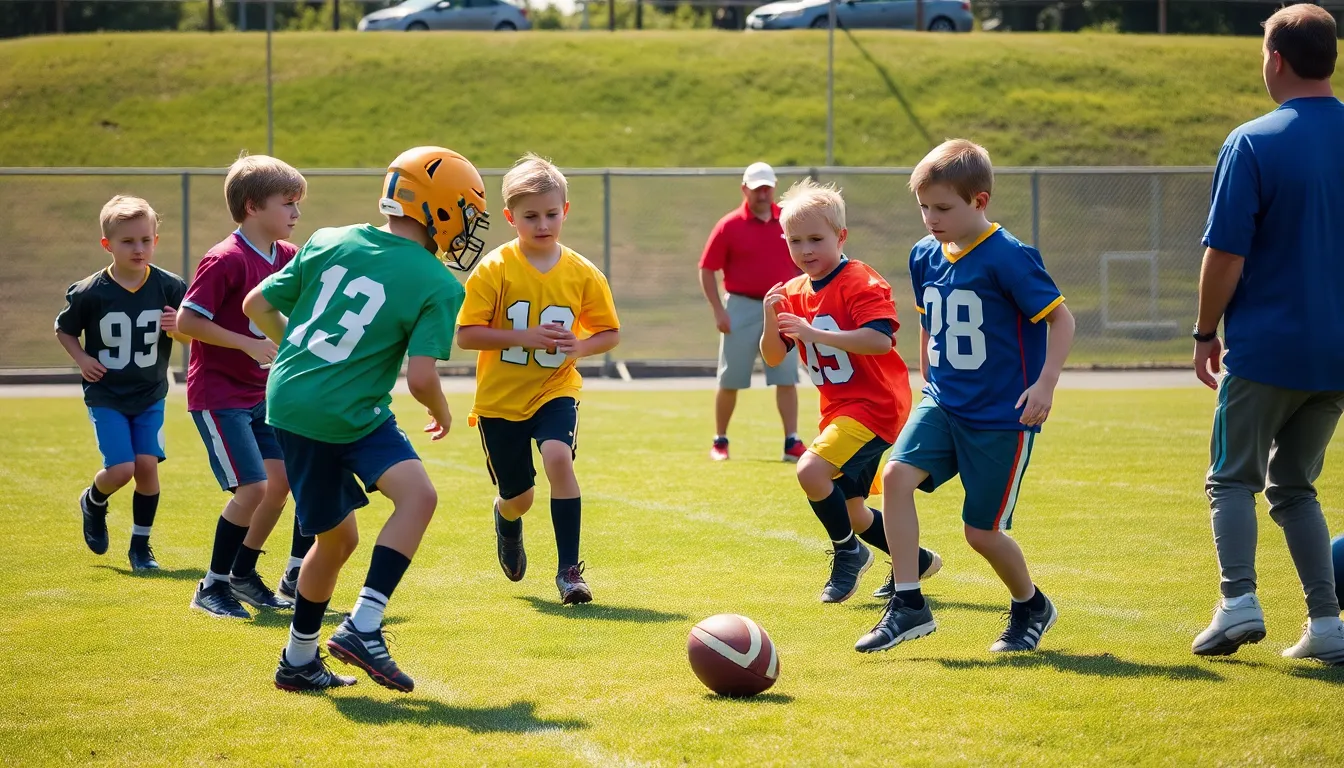Every aspiring football star starts somewhere, and for many, that starting point is a football camp. Imagine a place where kids can unleash their inner Messi or Brady while learning the fundamentals of the game. Football camps for beginners offer the perfect blend of skill development, teamwork, and a whole lot of fun.
Table of Contents
ToggleOverview of Football Camps for Beginners
Football camps for beginners offer a structured environment where young players can hone their skills and develop a love for the sport. These camps typically cater to children aged 6 to 14 years, creating age-appropriate sessions that foster learning and growth. Coaches at these camps focus on fundamental skills such as passing, dribbling, and shooting while also emphasizing fitness and teamwork.
Participants often experience a mix of drills, scrimmages, and interactive games. Such activities encourage players to apply what they’ve learned in real-game scenarios. Safety remains a top priority, with qualified coaches supervising all activities to ensure a safe learning experience.
Many programs also include educational components, teaching players about sportsmanship and respect for opponents. This well-rounded approach contributes to character development both on and off the field. Typically, camps last from a few days to several weeks, allowing for flexible scheduling based on family needs.
Parents frequently appreciate the social aspect of these camps. Young athletes not only improve their skills but also make friends who share similar interests. Affordable pricing varies based on duration and location, making these camps accessible for most families.
Reports indicate that participation in football camps positively impacts young athletes, enhancing their performance in school programs and local teams. By attending these camps, children gain valuable experience that lays the groundwork for future success in football, potentially following in the footsteps of their sports heroes.
Benefits of Attending Football Camps

Football camps offer numerous benefits for young players eager to develop their skills and passion for the game. These camps create a supportive environment focused on growth and teamwork.
Skill Development
Skill development forms the core of football camps. Coaches emphasize essential techniques such as passing, dribbling, and shooting, ensuring that participants receive individualized attention. Each session includes engaging drills designed to improve agility and coordination. Regular feedback from coaches helps players identify strengths and areas for improvement. Players learn the importance of both practice and persistence. With daily repetitions, they build confidence in their abilities. Progress observed during these camps often translates to improved performance in school teams and local leagues.
Social Interaction
Social interaction thrives at football camps. Young athletes bond with peers who share similar interests, fostering lasting friendships. Team activities promote communication skills and encourage collaboration on the field. Campers engage in scrimmages, which enable them to work together toward common goals. In this setting, they learn about sportsmanship and respect for opponents. Experiences gained at football camps contribute to personal growth and social awareness. Children often leave with a sense of belonging and pride in their accomplishments. Families appreciate how these connections enhance their child’s experience in sports and promote teamwork.
Types of Football Camps
Football camps cater to various needs and schedules, providing options like day camps and overnight camps.
Day Camps
Day camps offer a convenient option for families. These camps usually run from morning until late afternoon. Young athletes engage in skill-building activities, drills, and friendly scrimmages. Coaches lead structured sessions that focus on foundational techniques such as passing and dribbling. Participants benefit from a mix of physical activity and social interaction, making new friends in a fun environment. Most day camps last one to two weeks, allowing enough time for improvement without overnight commitments. Parents appreciate flexible drop-off and pick-up times that fit family schedules.
Overnight Camps
Overnight camps immerse participants in a focused football experience. Typically spanning several days, these camps provide a comprehensive training environment. Athletes practice their skills while living and bonding with peers. Coaches conduct intensive training sessions that cover advanced techniques and tactics. Campers often enjoy activities like team-building exercises and strategy discussions. Engaging fully in the sport enhances players’ confidence and camaraderie. Many overnight camps also include off-field education about sportsmanship, ensuring holistic development for young athletes.
What to Expect at Football Camps
Football camps for beginners offer diverse experiences that cater to young athletes. Participants can anticipate skill development, camaraderie, and structured training environments.
Training Sessions
Training sessions focus on essential football skills. Each session emphasizes passing, dribbling, and shooting techniques, enabling athletes to build a strong foundation. Coaches integrate drills, scrimmages, and games, keeping the atmosphere engaging and educational. Young players benefit from hands-on instruction and constructive feedback, ensuring steady improvement. Numerous camps may include specific goals targeted at enhancing fitness and agility, which supports overall performance.
Coaching Staff
Coaching staff at football camps consists of qualified professionals dedicated to player development. Each coach typically brings experience, ranging from competitive play to coaching certifications. Coaches prioritize individualized attention, helping young athletes refine their techniques and boost their confidence. With a focus on teamwork and sportsmanship, the coaching staff fosters a supportive environment. They often encourage communication among players, enhancing their social skills while motivating participants to strive for excellence. Qualified coaches help athletes not only improve on the field but also learn valuable life lessons off the field.
Choosing the Right Football Camp
Selecting the ideal football camp involves several key considerations. Assessing the age and skill level of the child is crucial, as camps cater to different experience levels. Many programs specifically target young players aged 6 to 14, providing a friendly environment for beginners.
Investigating the camp’s focus on fundamentals is also important. Camps that prioritize essential skills like passing, dribbling, and shooting offer a structured way to build confidence. Additionally, find out whether the camp includes activities that promote teamwork and sportsmanship. These components contribute significantly to personal development on and off the field.
Comparing day camps and overnight camps helps streamline the decision. Day camps, typically lasting one to two weeks, provide a flexible schedule with morning and afternoon sessions. Participants can enjoy skill-building activities without overnight stays. In contrast, overnight camps immerse players in intensive training over several days, fostering camaraderie among athletes.
Reviewing the qualifications of coaching staff strengthens the choice. Camps featuring experienced coaches often guarantee individualized attention and constructive feedback. Professional instructors committed to player development create a supportive atmosphere for young athletes.
Finally, considering feedback from previous participants adds value to the decision-making process. Hearing about successful experiences from other families may clarify what to expect at the camp. Families can feel confident in their choice when they select a program with a proven track record of enhancing skills and promoting a love for the game.
Football camps for beginners offer a unique opportunity for young players to embark on their athletic journeys. These camps not only focus on skill development but also foster essential life skills such as teamwork and sportsmanship. With qualified coaches guiding participants through structured training and engaging activities, children can build confidence while making lasting friendships.
Choosing the right camp tailored to a child’s needs ensures a positive experience that nurtures their passion for football. As young athletes immerse themselves in the game, they gain valuable lessons that extend beyond the field. Investing in a football camp can be a pivotal step toward a bright future in sports.




